Next year, I’m branching out in to a new genre—contemporary romance. My short story will…
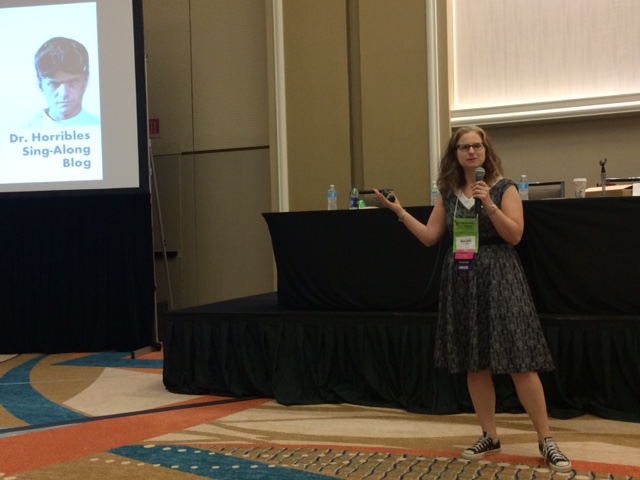
A Whedonite’s Total Eclipse
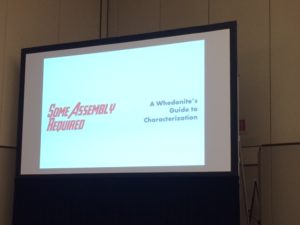 At the end of July I gave a presentation at the Romance Writers of America (RWA) Conference. Close to a hundred writers attended my workshop. It was the most people I’d ever taught without my co-presenter and co-creator, author, Kate Johnson. Attendees gave me hugs after. They met me outside the room to chat about what they learned, and some emailed me to tell me how much they enjoyed the presentation. They were excited to see this subject presented in a thoughtful way. They loved dissecting and learning about writing techniques by one their favorite pop culture writers.
At the end of July I gave a presentation at the Romance Writers of America (RWA) Conference. Close to a hundred writers attended my workshop. It was the most people I’d ever taught without my co-presenter and co-creator, author, Kate Johnson. Attendees gave me hugs after. They met me outside the room to chat about what they learned, and some emailed me to tell me how much they enjoyed the presentation. They were excited to see this subject presented in a thoughtful way. They loved dissecting and learning about writing techniques by one their favorite pop culture writers.
Joss Whedon
When Kai Cole, Whedon’s ex-wife, published her heart-wrenching piece about the end of their marriage, I was in shock. I was sickened over not only the multiple affairs Cole said Whedon had had but over the way she claimed he didn’t take responsibility for his actions. She stated that he manipulated her emotionally. He used his relationship with her to further his career and shield his actions. While touting his feminism in interviews and con panels and receiving awards for his “feminist” work, Cole’s account is that he treated the woman closest to him with disdain and gaslighting her regarding his actions. Based on Cole’s statements, it’s no wonder she was diagnosed with complex PTSD.
As of writing this piece, Whedon’s official statement was that he wasn’t going to respond to her accusations, which he claimed contained many inaccuracies and misconceptions, in order to protect his ex-wife and children. I usually wait to hear both sides of the argument before I form an opinion, and I will update this blog and my opinion with any new information that comes to light. There have been rumors of his infidelity in the Whedonite community, which were unsettling enough for a man whose public persona showcased his solid relationship with his wife who also partnered with him on projects.
By writing this piece, Cole has exposed herself, opening up a deep wound still healing for all to see. She has so much to lose from writing about her relationship with him. She’s opened herself up to people dissecting her every word, calling her a liar, questioning her motives. With his Hollywood influence, Whedon has the power in this situation. Although I have no doubt this will hurt his relationship with fans—the fan site Whedonesque closed after the story broke—he most likely won’t want for work. His films make money, and that’s what matters to this industry. He’ll recover.
I’ve read comments that claimed how fans shouldn’t worship Hollywood artists and celebrities. I didn’t worship him, he was only a man after all—but I did respect him. I respected him for his creative intelligence, his writing style, his stories, his work ethic. Then when I saw him interviewed and others interviewed about him, I respected him for the deep relationships he’d forged with his cast and crew, his work with women’s organization, his appreciation for his fans, and his strong marriage. Enjoyment of his stories inspired me to work with Kate to create our workshop; his caring and thoughtful public persona made me excited to teach about him to other writers. (For a more detailed analysis, the Daily Dot has a thoughtful piece on why his diehard fans feel betrayed.)
I will continue to learn from the series and movies he has written. They are part of pop culture cannon. They were a product of not only his imagination but many others (writers, actors, producers, designers) who elevated the stories with their talent. These stories have inspired me and filled me with joy for over 20 years. I won’t erase or ignore their influence because the creator is not the person he pretended to be. As many commented on Twitter, the art and the artist are two different entities. I still respect his work and the positive impact many of his storylines and characters have had on his fans. It is possible to enjoy one and not like the other.
And it’s also possible, as writers and creators, to learn from this.
- Love and respect those around you.
Never get too high on yourself and disrespect those who stood by you from the beginning. My husband has been such a positive influence on me from not only his own work ethic but his support of my writing. He reads my work, listens to my struggles, and provides feedback and help when I need it most. My family—mom and in-laws—encourage me when I’m feeling down and celebrate my successes. My group of amazing friends and critique partners have spent countless hours reading and editing my stories. They brainstorm with me when I’m stuck on a scene or plot point. They market my books and sit through my panels and workshops so I can see a familiar face in the crowd. Remember where you came from and remember who helped you get where you are now. - Take responsibility for your actions and mistakes.
Make a mistake and own it. We aren’t perfect. We are human. Learn from mistakes and admit to them. Fans are people too. They will relate to misjudgments because we have all been there. Every person has made mistakes, big and small, embarrassing and frustrating, hurtful and innocuous. Don’t blame others or society. Realize that we have limitations that affect our decisions. Mistakes allow us to grow. Whedon said in interviews about his craft that our story’s characters need to grow and change just like people need to grow and change in their lives. I hope that he applies this rule to himself. - Don’t be someone you’re not.
Authors Damon Suede and Heidi Cullinan gave a workshop at RWA about finding your author platform. One of their main points was to not put forth a public persona that didn’t reflect who you are. People have great bullshit detectors. Critics have been pointing out flaws regarding feminist themes in Whedon’s stories for years despite his outspoken views on women’s rights. (His unproduced Wonder Woman script especially gave me and many fans pause.) Your public persona may be larger than your personal one, but the views that you release publicly, the charities that you support, the hobbies and fandoms that you love should be true to who you are. You risk alienating your fans—one of the main reasons for your success—if they believe or discover you’re putting up a false front. - Be aware of your circle of influence.
Stephen Covey in Seven Habits of Highly Effective People spoke about our Circle of Influence—those people whom we influence (whether positively or negatively) by our actions and through sharing our worldview. From Covey’s website: “Proactive people focus their efforts on their Circle of Influence. They work on the things they can do something about: health, children, problems at work.”
As writers, our influence has grown from our families and friends to readers around the world. Our story themes, how our characters are shown, our views on life are read by hundreds if not thousands to millions of readers depending on our popularity. With the great power of reach, comes a great responsibility to do our best to influence those readers in a positive way, whether by creating diverse, multi-layered characters, showing respect for other industry pros, supporting one another, living honestly, writing stories that make readers think, smile, cry, feel something that makes them learn something new about themselves and their world. - Focus on diverse creators.
For several years, I’ve given this Whedon workshop at various conferences. I’ve focused on Whedon’s writing techniques. This story reminded me that it’s now time I expanded my focus. The worlds Whedon created were part of a collaboration. It doesn’t belong to him alone. It never did. The pop culture world encompasses a vast array of people and creators. I’m designing future workshops based on that dynamic—diversity in pop culture—along with women creators, actors, writers, directors who have inspired me. Because that’s the very heart of pop culture and the fandom that loves it. There are so many talented voices, whose day should come to influence the next generation of artists, so everyone can see themselves represented positively and be inspired.
This Post Has 4 Comments
Comments are closed.
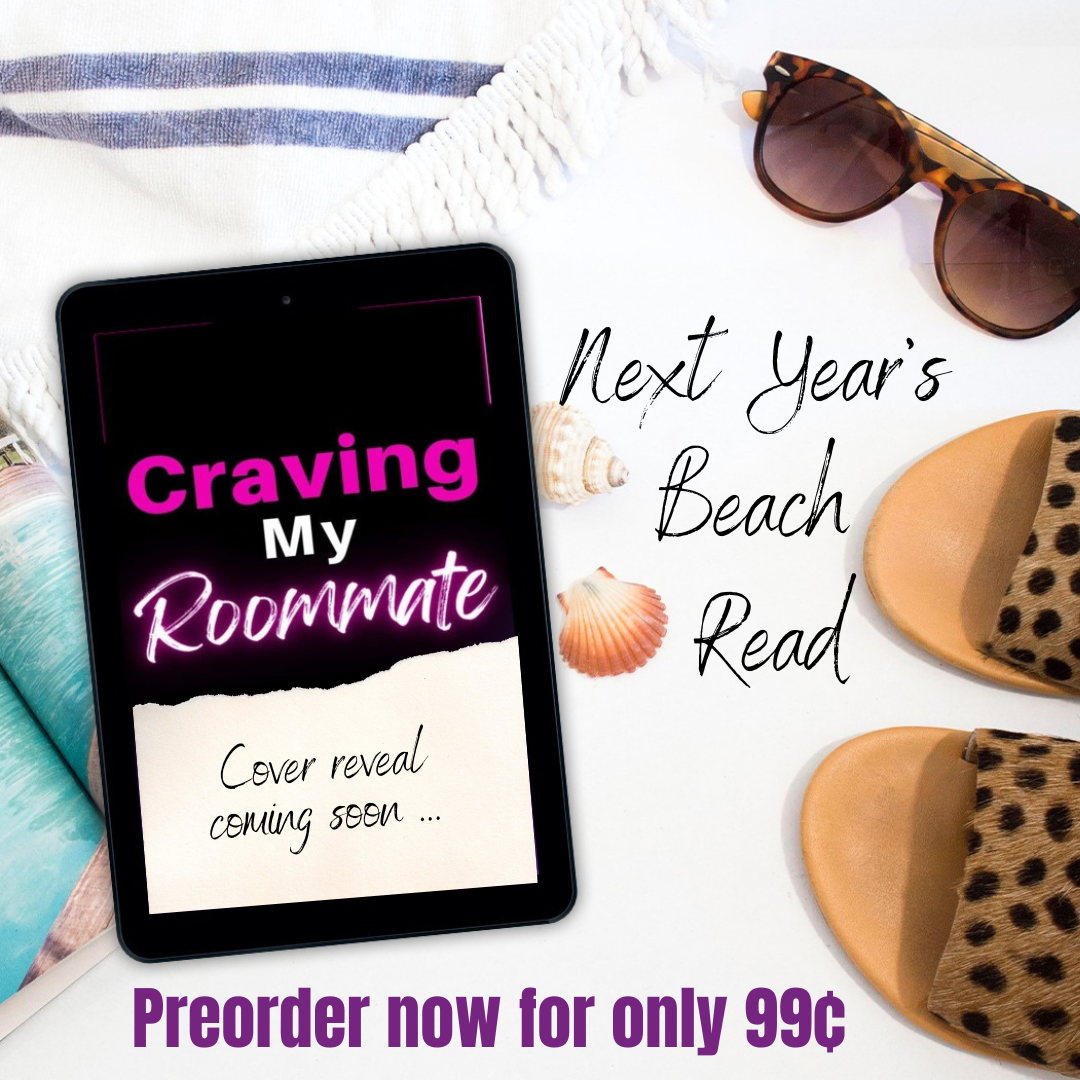
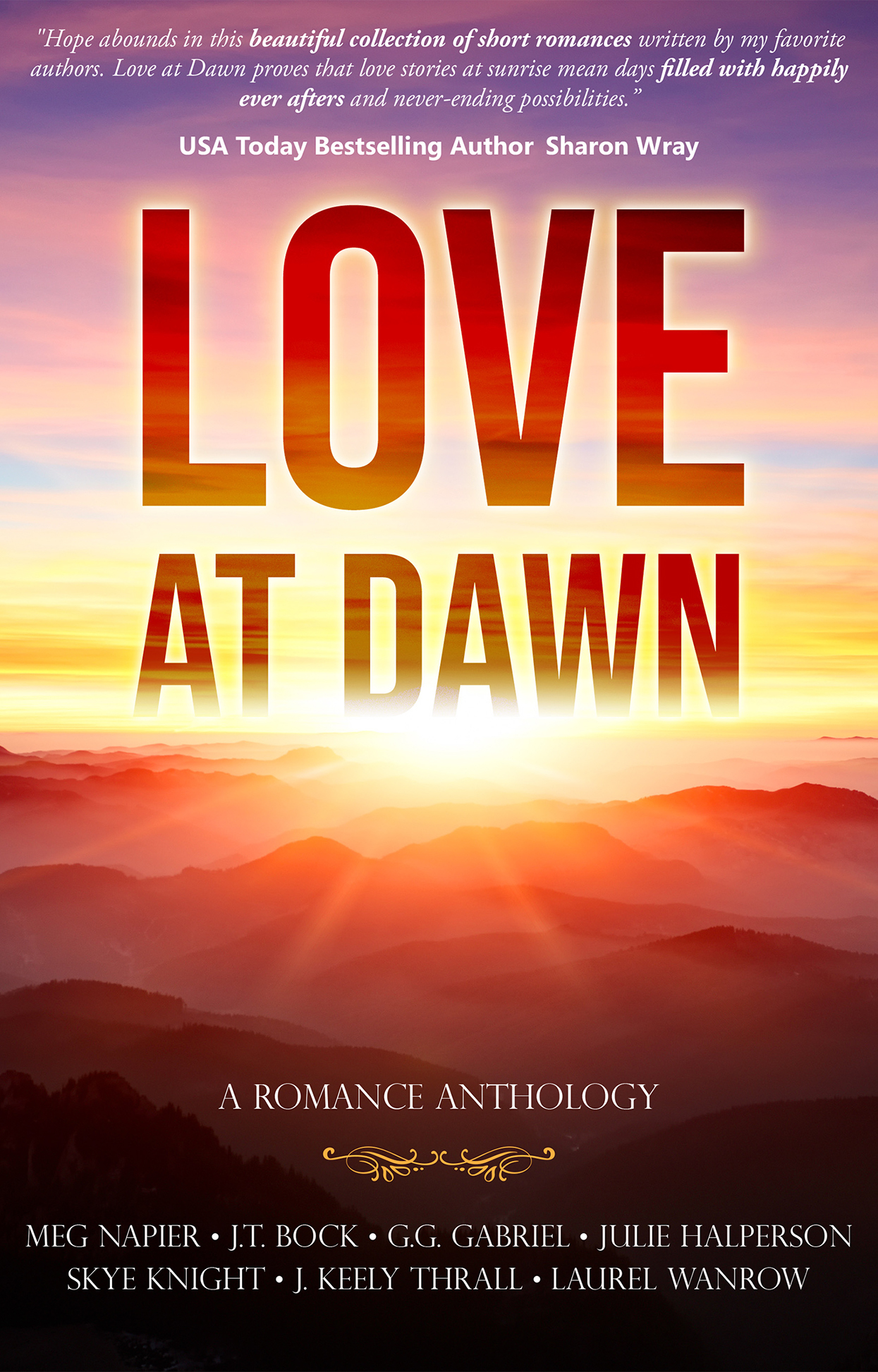
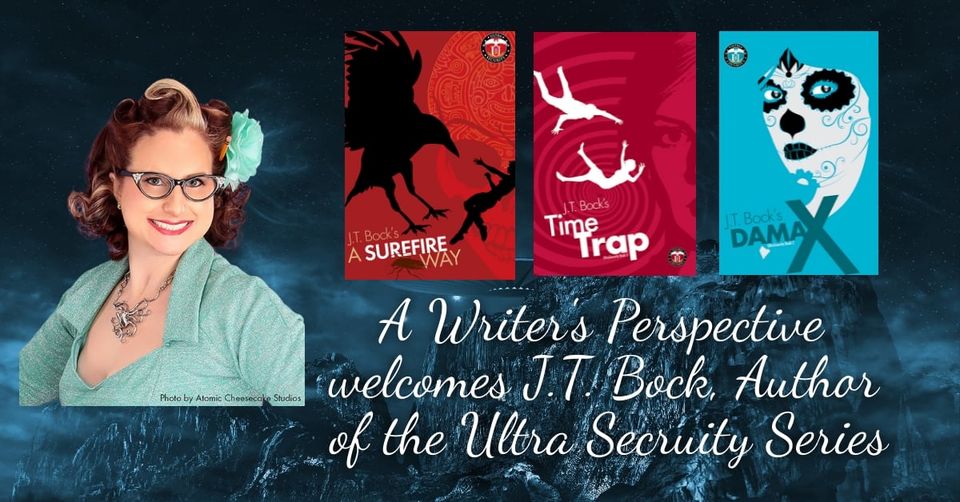
That was a very thoughtful, considered blog post. Having seen your Whedon presentation, I agree with all of your points. I love how you took the fall of your idol and turned it into something positive. I look forward to seeing the new presentations about other authors, directors, and artists.
Than you, Laura! I really appreciate your kind words. I thought about this for several days. It’s been tough to hear this. Although there have been rumors for awhile that he wasn’t what he seems.
I was at your RWA workshop and learned so much from your presentation, your post is thoughtful and I appreciate the idea of separating artist from their art though I admit I struggle with the idea.
Hi Joanna,
Thank you so much for stopping by and commenting. It means a lot to me to hear that you learned from my workshop (I was so nervous!), and it encourages me and makes me excited to start creating on new ones. I, too, am struggling with separating the artist from the art. It’s easier said than done. 😉